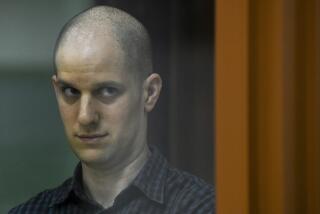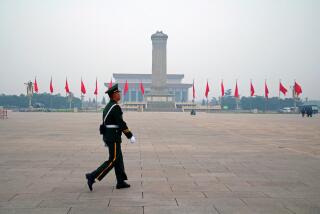Britain defends detaining the partner of Edward Snowden journalist
- Share via
LONDON – Stung by mounting criticism, the British government Tuesday defended the detention of the partner of an American journalist who helped reveal widespread spying by the U.S. National Security Agency, saying that authorities had a duty to act against someone suspected of possessing “highly sensitive stolen information.”
Britain’s Home Office said the detention of David Miranda, the partner of Guardian reporter Glenn Greenwald, was in line with authorities’ “duty to protect the public and our national security.”
Miranda was questioned for nine hours – the maximum permitted under anti-terrorism laws – at London’s Heathrow Airport on Sunday while in transit from Germany to his native Brazil. His computer and cellphone were seized.
Greenwald has published a series of stories in the Guardian newspaper on NSA surveillance based on documents leaked by contractor Edward Snowden. Greenwald and Miranda live in Rio de Janeiro.
The Brazilian government has demanded an explanation for Miranda’s treatment, and an increasing number of lawmakers and civil liberties activists in Britain have expressed alarm over the authorities’ apparent decision to target spouses and partners of whistle-blowing journalists under the color of combating terrorism.
In a television interview, Miranda said his interrogators did not ask any terrorism-related questions.
“They asked me about the protests here in Brazil. They asked me about my relationship with Glenn. They asked me about my family, my friends,” said Miranda.
He told the Guardian that authorities repeatedly threatened to have him thrown in jail if he refused to cooperate and that they “treated me like I was a criminal or someone about to attack the UK.” He is preparing to take legal action to recover his confiscated belongings.
Although he does not work for the Guardian, the newspaper paid for Miranda’s flight from Berlin to Rio. In Germany, Miranda had met with filmmaker Laura Poitras, who is working with Greenwald and the Guardian on issues of U.S. spying.
Britain’s Home Office released a statement justifying Miranda’s detention under sweeping anti-terrorism legislation that critics say gives authorities power to detain nearly anyone.
“If the police believe that an individual is in possession of highly sensitive stolen information that would help terrorism, then they should act and the law provides them with a framework to do that,” the Home Office said, adding: “Those who oppose this sort of action need to think about what they are condoning.”
But the nation’s official independent reviewer of terrorism legislation cautioned the government against misusing police powers. Yvette Cooper, the opposition Labor Party’s spokeswoman on domestic security, also called on Home Secretary Theresa May to provide a fuller explanation of the action against Miranda.
“Our national security needs to be protected,” Cooper said. “But the independent reviewer has made clear those powers need to be used proportionately and within the law.”
May said she had been briefed that there was “a possibility” Miranda might be detained, but that it was the police’s decision, not her office’s, to do so.
“If the police believe somebody has in their possession highly sensitive, stolen information which could help terrorists, which could lead to a loss of lives, then it is right that the police act,” May told a television interviewer. “But the law also has safeguards within it.”
The editor of the Guardian, Alan Rusbridger, also revealed Tuesday that British officials had ordered and overseen the destruction of hard drives at the newspaper’s London headquarters containing material leaked by Snowden, the NSA contractor.
Rusbridger wrote that the destruction of the hard drives was a futile and misguided effort in the digital age, since the data were stored elsewhere as well and would remain available to the Guardian. But he lambasted the government for trying to gag reporters.
“The state that is building such a formidable apparatus of surveillance will do its best to prevent journalists from reporting on it,” Rusbridger wrote, adding: “At least reporters now know to stay away from Heathrow transit lounges.”
ALSO:
Egypt arrests Muslim Brotherhood leader
At 123, Bolivian man may be the oldest human who ever lived
Former Pakistan leader Musharraf indicted in Bhutto assassination
More to Read
Sign up for Essential California
The most important California stories and recommendations in your inbox every morning.
You may occasionally receive promotional content from the Los Angeles Times.











